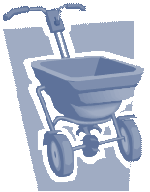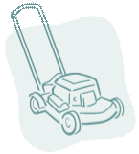Nearly everyone appreciates a well cared for lawn. To achieve the healthiest green lawn, many people turn to chemical fertilizers. Unfortunately, lawn fertilizers pose several risks to human health and water quality.
Hazardous chemicals in fertilizers include ammonium nitrate, ammonium phosphate, ammonium sulfate, pesticides and potassium chloride. Fertilizers can be corrosive to skin, eyes and mucous membranes and can potentially affect water quality.
Fertilizer Use
When using fertilizers, read labels carefully to ensure that you are properly protected and that you use the right amount of fertilizer for your lawn. Don’t fertilize before predicted heavy rain and be careful along lawn edges. Fertilizer left on sidewalks and driveways can easily be washed into storm water.
It is suggested that slow-release fertilizer is less-hazardous. Look for bags that have the word “WIN” on them. This indicates that the fertilizer contains water insoluble nitrogen.
Leftover Fertilizer
If you have fertilizer left over, store it in a sealed and labeled plastic bag and keep it away from children, pets and water.
If you don’t want to store it, it is best to find someone who can use it.
Disposal
Empty fertilizer bags that do not contain pesticides and weed killers can be disposed of in the garbage. If the fertilizer contains pesticide, please follow directions under “pesticides” on your product’s label to dispose of properly.
If you can’t find any way of using up the product, you may dispose of it by placing it in a heavy duty plastic bag. Please call the North Pointe Solid Waste District at 801-225-8538 and let them know you are bringing in fertilizer. This makes sure the fertilizer is handled safely. Be aware that there are minimal charges associated with disposal at the solid waste district.
Reducing The Need For Fertilizer
You can reduce the amount of fertilizer you need by frequently mowing your lawn with a mulching mower to a height of three inches or higher, and leaving the clippings on the lawn.
Using compost and soil amendments also reduces the need for fertilizer. A guide to composting is available in PDF format at the Utah State University extension website at http://www.extension.usu.edu/publica/gardpubs/compos01.pdf. Or you can call them at 370-8460 with questions about lawn and garden care.
Source: Eliminating Household Hazardous Waste. Idaho Department of Environmental Quality. Boise, Idaho. 1999. Pp 12-13.

